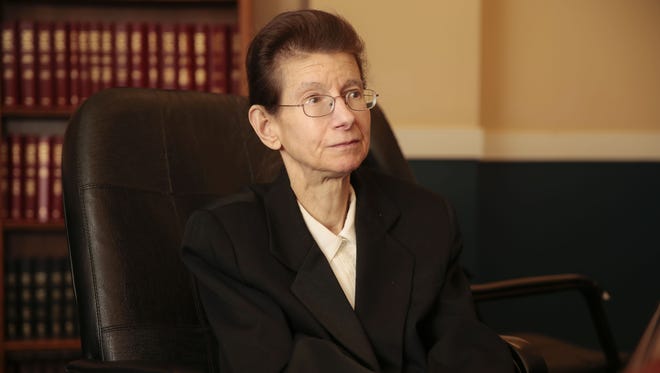
Dr. Barbara Temeck spent most of her days caring for the nation’s veterans, succeeding for more than 35 years in two intensely male preserves, the surgical suite and the leadership of VA hospitals. Then she arrived in Cincinnati, where she endured trials Shakespearean in dimension: a staff mutiny, public humiliation and demotion; a resulting federal criminal trial, dismissal and a costly fight to keep her medical license.
Yet no matter the crisis, her band of Cincinnati friends marveled that with walks and books and prayer, the devout, ascetic Temeck stoked her hope of redemption. But it was on a walk before dawn Dec. 6 where Temeck met a final challenge.

Temeck told police that while on West McMillan Street in Clifton Heights, a man pushed her to the sidewalk and kicked her. At first, she did not seek medical care, but once hospitalized, she deteriorated, suffered a stroke and died Jan. 7 at the University of Cincinnati Medical Center. She was 70.
“The strongest person I ever met,” Cincinnati neurologist Dr. Laura Sams called her friend. “Very few people would have the strength of will to go through what Barbara went through. But she had faith that justice would be served.”
Rising the ranks
Born June 30, 1950, in New York City, Barbara was the first of two Temeck daughters. As a teenager, she endured a bout of tuberculosis that scarred her lungs. She earned her bachelor’s degree at New York University in 1972 and her medical degree at Georgetown University in 1976. She entered the fraternity of cardiothoracic surgery at the renowned cancer center of Memorial Sloan Kettering Hospital in New York City.
By 33, she was chief of cardiac surgery at the Washington, D.C. Veterans Affairs Medical Center. Before 40, Temeck had worked as a manager at half a dozen VAs. For nine years, she was chief of staff at the Edward J. Hines VA Medical Center in Chicago, and when she left in 2010, colleagues jammed a massive scrapbook with hand-written tributes to her leadership and acts of kindness.
Temeck maintained a surgery schedule and performed research for at least 50 publications. She cared for her father in her home until his death, but she told The Enquirer that she most cared about the VA. “We’re all here at the VA to deliver the best possible care for veterans. That’s all I want."
Chronically underweight and barely 5 feet tall, Temeck lived in small apartments within walking distance to her VA hospital. She cared little for clothes and wore her long hair looped and pinned at the back of her neck.
She enjoyed socializing, and in Chicago, she befriended the Hetricks – Jack, a high ranking VA administrator, and Kathleen, a former VA nurse in disability who in time came to rely on Temeck to manage her medical care.
When the Hetricks moved to Cincinnati for the VA, Jack Hetrick suggested to Temeck that she apply to be acting chief of staff of the Cincinnati VA Medical Center. The 117-bed facility cares for more than 40,000 veterans in the region. Temeck got the job in February 2013, taking an apartment across Vine Street from the Corryville hospital, walking to work every day before dawn.
‘At cross purposes’
Previous VA managers gave the Cincinnati VA a light rein, and Temeck soon found bad habits. Doctors had not been working full schedules. The hospital owed more than $1 million in overtime for nurses covering for absent doctors. VA doctors sent patients to UC Medical Center for treatment the Cincinnati VA could provide. UC Health, the nonprofit entity that operates the academic hospital, then billed the VA.
Many VA doctors also were connected to the UC Health Physicians practice or the UC College of Medicine.
Temeck was “uncompromising in holding people accountable and working as hard as they could to fill their schedules. That was her job, to ensure the best care of the veterans,” said Sams, chief of neurology at the Cincinnati VA. “Instead, they imposed this unjust reprisal. She was at cross purposes with people who didn’t want those same goals.”

“Barbara was plain-spoken. She was female and not a physically attractive person. It was a male-dominated leadership and a very politically connected leadership.”
The tension that Temeck met in Cincinnati springs from deep roots. After World War II, VA hospitals needed doctors, and medical schools needed to train doctors, and so began an intimate partnership in which the private concerns often dictated the public operation. In Cincinnati, VA leaders tried three times to remove the “acting” from Temeck’s title, but the medical school leadership refused to go along.
Trials of many kinds
That signal of displeasure did not rid them of the troublesome boss. Next, a “whistleblower complaint” about Temeck from 34 anonymous doctors, nurses and other caregivers went to the Department of Veterans Affairs in Washington.

When that letter did not produce results, the gripe got leaked to Cincinnati television station WCPO with an attention-grabbing allegation: that Temeck improperly wrote prescriptions of narcotics for Kathleen Hetrick. The VA opened an investigation and demoted Temeck to a data-entry desk in the hospital’s basement.
To get her job back, Temeck hired Cincinnati employment lawyer Ken Hawley and his legal assistant Lori Zimmerman, and they were working on that end still in 2020. They took care of Temeck and made dinners for her. In a statement upon her death, Hawley noted "her graciousness and the gratitude she expressed each time I spoke with or received an email from her."
Temeck "was of such strong will that she never gave up her fight to restore her name and reputation. She hoped someday to return to her work at the VA.”
Over time, the “whistleblower” complaint fizzled. But in a region devastated by an opioid epidemic fueled by improper prescriptions, the U.S. attorney for southern Ohio charged Temeck with three counts of violating the scope of her federal license to prescribe drugs to Hetrick prescriptions. The VA fired her.
In the courthouse
Covington lawyer Benjamin Dusing represented Temeck when the case went to a January 2018 jury trial in U.S. District Court in Cincinnati, Judge Michael Barrett presiding. In her own defense, Temeck testified that she rarely wrote prescriptions and only did so for Kathleen Hetrick as a doctor easing a sick patient in an emergency. Dusing argued no other doctor in the United States had faced federal prison time and thousands of dollars in fines for three prescriptions. The jury convicted on one count and acquitted on the other two.
Two months later, Barrett ruled the evidence did not support the conviction and threw it out. Then the state of Illinois then spent a year trying to revoke Temeck’s license to practice medicine, but with Hawley and Zimmerman, she prevailed.
Dusing said, "Her outer frailty, hardly the image of strength, belied a ferocious inner commitment to the mission of the VA and to the principles she believed in. Which was, above all, truth.”
“Money meant nothing to her,” Sams said. “She didn’t have anything. She was a person who had no interest in material things. I think that’s what people, they weren’t banking on that. This was an expensive fight. Between (the criminal trial) and the extremely good work done by Hawley, it was way up there.”
Hawley said, "Dr. Temeck was vindicated by the VA’s inspector general, by the federal court system and by her state medical licensing board. In the end, Dr. Temeck was found to have done nothing wrong, but the effect of the media, political and personal attacks against her was to destroy her lifelong career of service to the VA and her personal and professional reputations.”
A run to Walmart
Temeck lived in a tiny, unheated apartment on Glendora Avenue, near Short Vine. A contemplative Roman Catholic, she worshiped alone. Every day before dawn, in every weather, she walked for miles. She went to the Clifton branch of the Hamilton County Public Library to read or watch movies on the computer, but Sams said she stopped when the pandemic made indoor spaces risky.
Her circle grew to include Dr. Ajay Malhotra. The VA radiologist had joined the "whistleblower" complaint that started the landslide against Temeck, but when the U.S. attorney pursued the criminal case on such flimsy evidence, “I realized she was right. She’s a good person.”
After Thanksgiving, Malhotra said, Temeck asked him for a ride to Walmart to buy pepper spray. Malhotra said she told him that someone had been bothering her but gave no further description. Malhotra urged her to stay away from that person.
On West McMillan Street
Mystery clouds the Dec. 6 assault. Temeck waited a day to call police. She reported that between 6 and 6:30 a.m., she had been walking on West McMillan Street in front of Duttonhofer’s Books when a man in his 50s pushed her to the ground. She said she did not know the suspect “but has seen him around in the past.” The report has no more details. Police did not investigate further.

But Sams said Temeck also told her sister, Jean, in suburban Washington, D.C. that the man had also kicked her, and Temeck complained of a headache. “Like all physicians,” Sams said, “she couldn’t see objectively what was going on. Maybe she thought it was a cold or some bruising from the fall when she was pushed.”
Then a symptom appeared that the heart surgeon could not wish away: atrial fibrillation, an irregular heartbeat. On Dec. 13, Temeck asked Sams for a ride to Christ Hospital in Mount Auburn. Sams feared Temeck would die on the way. Sams said Temeck was placed on a ventilator that day. Later, she was transferred to the University of Cincinnati Medical Center. A CT scan found bleeding in her brain characteristic of trauma and a lacerated liver. She had a stroke Dec. 22.
Cincinnati Police spokesman Lt. Steve Saunders told The Enquirer that police have little to pursue without an autopsy and a coroner’s determination that the Dec. 6 assault caused the injuries that led to Temeck’s death.
Just before Christmas, Sams, Zimmerman and Hawley said Jean Temeck forbade them from having any more contact with her sister. Jean Temeck declined to speak to The Enquirer.
“If Barbara could speak to me now,” Sams said, “she would say, ‘It’s in God’s hands, and I trust in him.’ She wasn’t afraid to die."
Dusing said, “She stared down the most powerful institution in the world, the United States government. She was a pioneer and a brave heart in every way. I will miss her dearly, and we will all miss her example. She was brave as hell, courageous as hell, dutiful as hell. I’ll never forget her.”
Temeck is survived by her sister. Funeral arrangements were not known, although her friends were planning a memorial service on a date to be determined.
Source link









